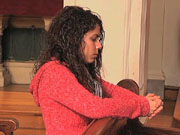VOA标准英语2012--American Students Find New Expressions of Faith
搜索关注在线英语听力室公众号:tingroom,领取免费英语资料大礼包。
(单词翻译)
American Students Find New Expressions of Faith
Going to college is often a chance for young adults to explore attitudes, ideas and beliefs different from the ones they grew up with. In many cases, students are finding new ways to express their faith.
American college students are exposed to new ideas that can challenge their religious beliefs, but campus clergy1 say many remain religiously committed.
A traditional festival lets Indian students share their faith and culture with others. Many are doing that today, says Chandni Raja of the Hindu Student Organization at the University of Southern California. “Meeting other groups on campus and trying to get that dialogue going, while also maintaining our own communities as a strong place where people can come together,” she said.
USC's dean of religious life, Varun Soni, says many students embrace religion on their own terms. “They're more interested, I find, in making religion work for them as opposed to working for it," Soni stated. "So they interpret their religious and spiritual traditions in a way that makes sense for them.”
And at Stanford University, the school’s dean for religious life, Scotty McLennan, is also seeing a new openness. “I think the most exciting thing that’s happening is that students really are learning how to listen to each other across traditions, and they really are getting more interested in that kind of empathetic listening," he said. "And presence to each other, hearing each others' stories.”
 |
| As young adults, some college students find opportunity to explore attitudes, ideas and beliefs some find new ways to express their faith |
Some students maintain their traditional practices, and others become less observant, but many want to share their faith and traditional culture with others.
Omer Bajwa, coordinator2 of Muslim life at Yale University, counsels Muslim students, and he says have many questions about the role of faith. “In a time of increasing religiosity but also increasing secularism3, where are the fault lines, what are the tensions and what are the areas of conversation? I think we find common questions coming across,” he said.
Probing discussions in the classroom and with students of different backgrounds can challenge a student’s faith, says Rabbi Patricia Karlin-Neumann, senior associate dean for religious life at Stanford University. “The question in my mind is whether that questioning leads to a falling off of commitment or a deepening of commitment," she pondered. "And my experience is that people who claim their religious traditions after having or in the process of being engaged with other people are far more inclined to see what they have as something precious.”
Interfaith service projects and community dialogues are bringing students together at schools all across the country, says Tahera Ahmad, the associate university chaplain at Northwestern University. “What I’ve seen on college campuses is that the young students who are from various faith backgrounds are coming together and not necessarily leaving their faith at the door, but not also wearing their faith on their sleeve, but finding some kind of balance as to say, ‘This is who I am. I am a Muslim, I am a Christian4, I am a Jew. We’re all coming together towards making the world a better place,’” she said.
These college chaplains says that students are maturing in their faith by meeting and learning from those of other faiths.
 收听单词发音
收听单词发音 




